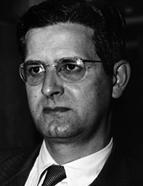

Born into a wealthy family of Portuguese origin established in São Paulo since the 18th century, he enjoyed a comfortable and stable life due to his origin and social position in the coffee aristocracy, which also had diversified investments in commerce, industry, and finance. His studies and schooling were provided by private tutors at the Jesuit college and in Eastbourne, England. In 1924 he entered the Law School of the University of São Paulo, where he took part in the student movement and the opposition to the political dictates of the Paulista Republican Party, both at state and national levels. At the end of the course, he toured countries in Europe and the Middle East. He supported the armed movement that brought Getúlio Vargas to the head of the government in October 1930, carrying out specific actions before and after the rebel uprising's victory. In 1931 he became involved in the class struggle, reading socialist authors and supporting the international communist movement. In 1933 he visited the Soviet Union with his wife, on his own initiative and with his own resources. For a short time he worked as a lawyer and enrolled in a doctoral programme at the Law School, but soon abandoned both those plans. In 1935 he enrolled in the History and Geography programme at the University of São Paulo (USP), an institution created the previous year. He was fluent in English and French, a skill that enabled him to get closer to the foreign professors, particularly French, who had been hired to establish higher education in the humanities: Claude Lévi-Strauss, Fernand Braudel, Pierre Monbeig , among others. The experience definitely marked his professional career and made him a critical intellectual who was active on the Brazilian political and cultural scene between 1930 and 1980. On two occasions he tried to join the university as a professor. The first one was in 1954, in a competition for the Chair of Political Economy at the Law School of the University of São Paulo. He was approved but not appointed to the institution's teaching staff. The second one was in 1969, after the dismissal of professors at the USP, when he applied for the chair of Brazilian History. This time the competition wasn't even held. His participation in the communist movement, from his youth until the end of his life, earned him arrests, persecution, censorship, and social and ideological restrictions. He was not ostentatious in his lifestyle, and the family's economic status allowed him to act with intellectual, material, and political independence. He was the author of 14 works in the areas of history, geography, travel, politics, economics, philosophy, and law. He was also a book and magazine editor. His books have been published in English and Spanish.
This work is financed by national funds through FCT - Foundation for Science and Technology, I.P, in the scope of the projects UIDB/04311/2020 and UIDP/04311/2020.
